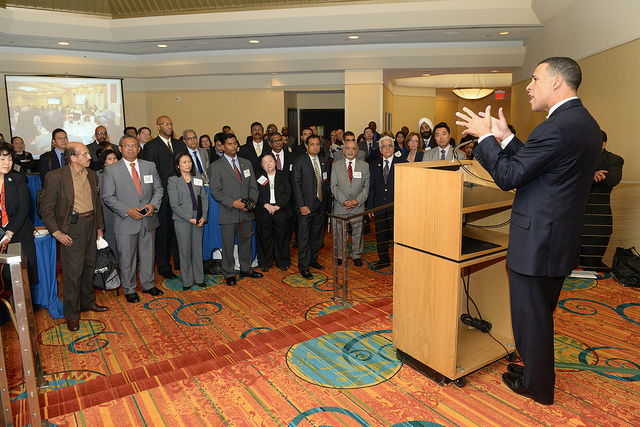
A business conference like this one can be promoted on social media. Photo credit: Maryland GovPics
Events are, after all, social. And social media has emerged as a primary tool to promote most any type of event, whether it’s a conference, webinar, or fundraiser. While email remains the core promotion tool to reach previous contacts, social media is especially useful in promoting an event to new potential attendees. Publicity in traditional news media can supplement social media promotion. Event marketers typically cite Facebook, Twitter and LinkedIn as the best social media networks for promoting events.
Facebook has the largest user base, an incredible 1 billion active users worldwide. No matter what the event, prospective attendees likely to be on Facebook. Plus, event sponsors can share different types of content, including photos, videos and surveys.
Twitter is especially popular among event promoters and attendees, according to Constant Contact, which offers EventSpot, an event planning product. Twitter provides a quick way to spread messages, and its hashtags help organize interests and generate conversations. It’s the most public of all major networks, since users can view content of others with requests or approvals.
LinkedIn is valuable for promoting business events, such as training seminars, professional conferences, and networking gatherings. Promoters can use LinkedIn Groups through all stages of the event, including planning, promotion and post-event follow up.
Planning Events with Social Media
Social media can also help you plan events. If you’re considering holding an event, first ask your social media followers if they’d be interested in attending by using a short survey, advises Constant Contact. An online survey can also poll potential attendees on their preferences for the event’s date, location and possible topics.
Constant Contact also recommends that event promoters:
• Create a dedicated Web page for the event that includes event details, a registration form and blog posts.
• Continually promote the event with social media posts as well as email.
• Announce as the event approaches that there are only a limited number of seats remaining if that’s the case. If people cancel at the last minute, announce the openings.
The Importance of Hashtags
Alon Alroy, co-founder and CMO Bizzabo, an event planning and management service, recommends these steps in a blog post for Tint.
• Create a hashtag. The Twitter hashtag created especially for the event should be relevant, unique and short. Be careful that it cannot be interpreted in unintended ways.
• Use the hashtag everywhere: your event website, dedicated emails, social networks, and the event’s mobile app. Attendees can use the hashtag to converse with event managers, speakers, and each other.
• Start early. Begin your promotion a few months before the event to gain momentum and reach more people and increase your likelihood for success.
• Continue to share content related to the event and initiate conversation with speakers, attendees and potential attendees. Consider holding contests and giveaways to give a sneak peek of the event content.
• Encourage attendees and speakers to mention the event and share updates. By sharing event news with their own followers, they’ll help spread the word. Remind speakers that more attendees mean greater exposure for them.
• Create a Facebook page or a LinkedIn group for the event. Post any relevant news about the event, including activities, sponsors, special guests, speakers, and the agenda.
After the event, ask attendees what they liked best, least, and what they’d like to see next time. That will make them more likely to return and share their positive experiences with their own networks
Bottom Line: Social media marketing has become a must-have method to promote business and not-for-profit events. An intensive event promotion campaign on social media networks can build buzz about the event, attract attendees, and help keep attendees informed as the event approaches. It can also build your email list for future events.
Download the 2020 Ultimate Guide to Media Monitoring, Measurement & Analytics for PR & Marketing
William J. Comcowich founded and served as CEO of CyberAlert LLC, the predecessor of Glean.info. He is currently serving as Interim CEO and member of the Board of Directors. Glean.info provides customized media monitoring, media measurement and analytics solutions across all types of traditional and social media.





I teach a hands-on PR class in the Music Dept. of William Paterson University in northern NJ.
I find your tips extremely useful, educational and timely. I make copies for my class and distribute them at the weekly evening class. I’ve taught this Spring semester class for 20 1years and as PR is rapidly changing year to year, staying current is an ongoing evolution.
The students are media-minded but unaware of how to construct an effective news or press release. They do not understand how PR has changed to “news” and still think it is “hype and self-serving publicity only”. We both know that myth prevails and tips and experience help me dispel that misconception.
I wanted to thank you for your help.